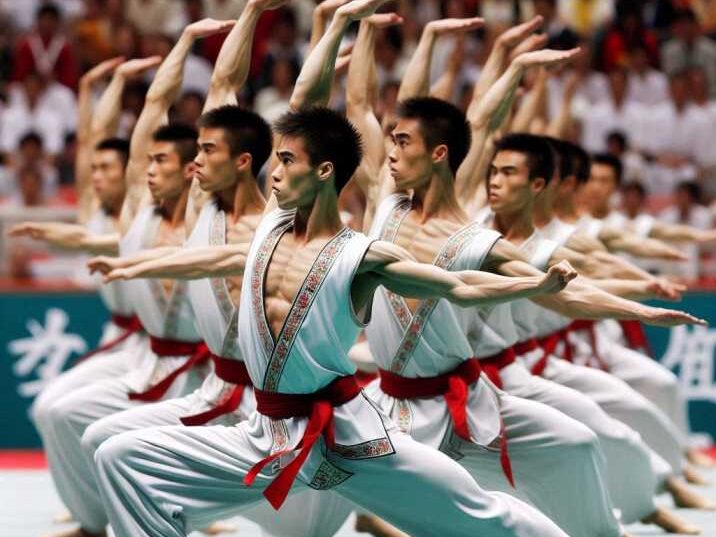Introduction
Table of Contents
Wushu is a Chinese martial art that is known for its dynamic movements, graceful forms, and complex techniques. But is it just a martial art, or can it also be considered a sport? For many, the answer is both. Wushu is not only a traditional form of self-defense but also a competitive sport that demands physical strength, mental discipline, and unwavering focus. Training in Wushu requires hours of dedication, much like any sport, and its techniques are performed at local, national, and international levels, often with strict rules and scoring systems.
Is Wushu a Sport? In this article, we’ll explore how Wushu qualifies as a sport, the kind of training it involves, and why it’s a practice that improves not just physical ability but mental clarity and focus.

What is Wushu?
Wushu, often referred to as “Chinese Kung Fu,” is a martial art that dates back thousands of years. It was originally developed as a means of self-defense and physical fitness, but over time, it evolved into a systemized practice that is now recognized as both an art form and a sport. Wushu is divided into two categories:
- Taolu (Forms) – Focuses on routines and choreography.
- Sanda (Sparring) – Combines fighting techniques with physical combat.
Both Taolu and Sanda require practitioners to have speed, agility, and strength, skills that are common in many sports.
Why is Wushu Considered a Sport?
Wushu has been recognized as a sport because of its structured competitions and organized rule sets. These competitions feature athletes who perform routines in front of judges, much like gymnastics or figure skating. Competitors are scored based on technique, form, and performance, with rules ensuring fairness and consistency across the board.
Key Features That Make Wushu a Sport: Explained
1. Organized Competitions
Wushu is recognized as a competitive sport because it is performed in organized competitions at regional, national, and international levels. Athletes from around the world participate in tournaments where they showcase their skills in front of judges. These events are similar to other sports like gymnastics or figure skating, where participants perform choreographed routines or engage in sparring matches. Competitions like the World Wushu Championships or the Asian Games highlight the global reach and structure of Wushu, with strict rules and categories that ensure fairness.
2. Scoring System
Much like other precision-based sports such as gymnastics or diving, Wushu has a detailed scoring system that judges athletes based on precision, form, and difficulty. Athletes perform specific movements and routines, which are evaluated by judges for accuracy, grace, and execution. For example, in Taolu (forms), athletes must follow a set routine with high-level technical movements, and judges award points based on how well these moves are performed. In Sanda (sparring), fighters are judged on their ability to land clean, effective strikes and defend against their opponent’s attacks.
3. Physical and Mental Training
Wushu training requires both physical strength and mental discipline, much like other sports. Athletes must develop agility, endurance, and flexibility through rigorous training sessions. Physical exercises such as cardio workouts, strength training, and flexibility drills are essential to mastering Wushu. However, the mental aspect is equally important. Practitioners must maintain focus and discipline to remember complex routines and stay calm during competitive events. The combination of physical fitness and mental sharpness makes Wushu a sport that tests the whole body and mind.
4. Team and Solo Events
Wushu features both team and solo events, giving athletes the opportunity to compete individually or as part of a group. In solo events, competitors perform routines on their own, showcasing their individual skill and precision. In team events, multiple athletes perform synchronized routines, where they must move in perfect harmony with one another. This is similar to sports like synchronized swimming or gymnastics, where athletes work together to perform flawless group routines. Whether competing alone or as part of a team, Wushu athletes must demonstrate exceptional coordination, timing, and teamwork.
Training in Wushu Requires Discipline and Focus
Wushu isn’t just about mastering physical movements; it demands incredible mental discipline and focus. Practitioners must remember intricate routines and perform them with precision, often under the pressure of judges and an audience. This focus and discipline translate well to other areas of life, such as academic success or personal goals.
The Core Elements of Wushu Training: Explained
1. Concentration
One of the most critical aspects of Wushu training is concentration. Each movement in Wushu is highly technical and requires athletes to maintain intense focus throughout their practice and performance. Practitioners must memorize complex sequences of movements, known as forms or Taolu, and execute them with precision. This mental challenge is comparable to learning a detailed choreography, where a lapse in concentration can lead to mistakes. Moreover, in competitive settings, athletes must perform under pressure, where distractions are common. Concentration helps them stay composed, ensuring that each technique is performed flawlessly. This level of focus also translates to improved performance in other areas of life, such as school or work.
2. Discipline
Another core element of Wushu training is discipline. Mastering Wushu, like any sport, takes consistent practice and dedication. Athletes spend countless hours honing their techniques, repeating movements until they achieve perfection. This disciplined approach is necessary to develop muscle memory, strength, and coordination. Whether it’s perfecting a strike, improving flexibility, or increasing endurance, dedication is key. Wushu practitioners often train for years to reach a competitive level, learning to push through challenges and stay committed to their goals. The self-discipline cultivated through Wushu training is not only essential for success in the sport but also instills a sense of responsibility and perseverance in everyday life.
3. Physical Fitness
Wushu training is a physically demanding sport that requires a high level of physical fitness. Athletes must have strong cardio endurance, muscle strength, and flexibility to perform the dynamic movements and techniques required in both forms (Taolu) and sparring (Sanda). Training for Wushu often involves a combination of martial arts practice and cross-training exercises. For example, athletes may engage in activities like running, jumping, or weightlifting to build endurance and strength. Flexibility exercises, such as stretching and yoga, help improve the range of motion necessary for executing kicks, stances, and acrobatics. This physical training not only enhances an athlete’s performance in Wushu but also promotes overall fitness and well-being, making it a well-rounded exercise regimen.
How Wushu Can Improve Focus in School and Life
Many students who practice Wushu find that the skills they learn during training – such as focus, patience, and perseverance – help them in other areas of life. Training in Wushu often improves time management, concentration, and the ability to stay calm under pressure.
This makes Wushu not only a great way to stay fit but also a tool for personal development.
Wushu in International Competitions
Wushu has grown in popularity around the world and is now part of various international sporting events. Some of the major competitions that include Wushu are:
- World Wushu Championships
- Asian Games
- World Combat Games
These events showcase Wushu as a sport, with athletes from different countries competing for titles and recognition. Wushu has even been a demonstration sport in the Olympics, further cementing its status as an international sport.
The Benefits of Practicing Wushu
Wushu training offers numerous benefits for both the body and the mind. Here are some key reasons why Wushu is great for young practitioners:
- Physical Fitness: Wushu improves strength, flexibility, and coordination.
- Mental Strength: The focus required in Wushu helps improve concentration and discipline.
- Self-Defense: While it’s a sport, Wushu is also a martial art, teaching valuable self-defense techniques.
- Confidence: Performing routines or sparring in front of an audience helps boost self-confidence.
Wushu and Modern Sports
While Wushu has its roots in ancient China, it is a modern sport that appeals to athletes of all ages. Its inclusion in international competitions showcases its relevance and popularity around the world. Wushu schools continue to thrive, teaching new generations the art of this martial sport.
Table of Information: Is Wushu a Sport?
| Aspect | Description |
|---|---|
| Type | Martial arts and competitive sport |
| Categories | Taolu (Forms), Sanda (Sparring) |
| Training Focus | Strength, agility, mental focus, flexibility |
| Competition Level | Local, national, and international |
| Mental Benefits | Improved focus, concentration, and discipline |
| Physical Benefits | Increased cardio fitness, strength, and flexibility |
| International Events | World Wushu Championships, Asian Games, World Combat Games |
Conclusion: Is Wushu a Sport?
Yes, Wushu is definitely a sport, but it’s also much more. The physical and mental demands make it a challenging practice that goes beyond mere performance. Whether you’re looking to improve your fitness, learn self-defense, or build mental discipline, Wushu offers a comprehensive approach to personal development. As the sport continues to gain international recognition, it’s clear that Wushu’s impact goes beyond the mat or the competition stage. It’s a lifestyle that teaches concentration, discipline, and focus – skills that benefit you in every area of life.

FAQs About Wushu
- Is Wushu the same as Kung Fu?
No, Wushu is a modern sport derived from traditional Chinese Kung Fu, but the terms are sometimes used interchangeably. - Can anyone learn Wushu?
Yes, people of all ages and fitness levels can learn Wushu, though it requires dedication and practice. - Is Wushu a part of the Olympics?
Wushu has been a demonstration sport in the Olympics but is not an official Olympic event yet. - How long does it take to master Wushu?
Mastering Wushu can take years, but beginners can learn basic techniques within a few months of regular practice. - Is Wushu good for kids?
Yes, Wushu is great for kids as it helps improve focus, discipline, and physical fitness.


